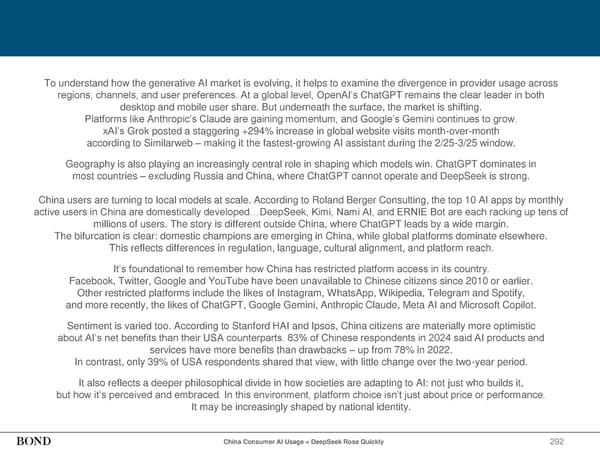292 To understand how the generative AI market is evolving, it helps to examine the divergence in provider usage across regions, channels, and user preferences. At a global level, OpenAI’s ChatGPT remains the clear leader in both desktop and mobile user share. But underneath the surface, the market is shifting. Platforms like Anthropic’s Claude are gaining momentum, and Google’s Gemini continues to grow. xAI’s Grok posted a staggering +294% increase in global website visits month-over-month according to Similarweb – making it the fastest-growing AI assistant during the 2/25-3/25 window. Geography is also playing an increasingly central role in shaping which models win. ChatGPT dominates in most countries – excluding Russia and China, where ChatGPT cannot operate and DeepSeek is strong. China users are turning to local models at scale. According to Roland Berger Consulting, the top 10 AI apps by monthly active users in China are domestically developed…DeepSeek, Kimi, Nami AI, and ERNIE Bot are each racking up tens of millions of users. The story is different outside China, where ChatGPT leads by a wide margin. The bifurcation is clear: domestic champions are emerging in China, while global platforms dominate elsewhere. This reflects differences in regulation, language, cultural alignment, and platform reach. It’s foundational to remember how China has restricted platform access in its country. Facebook, Twitter, Google and YouTube have been unavailable to Chinese citizens since 2010 or earlier. Other restricted platforms include the likes of Instagram, WhatsApp, Wikipedia, Telegram and Spotify, and more recently, the likes of ChatGPT, Google Gemini, Anthropic Claude, Meta AI and Microsoft Copilot. Sentiment is varied too. According to Stanford HAI and Ipsos, China citizens are materially more optimistic about AI’s net benefits than their USA counterparts. 83% of Chinese respondents in 2024 said AI products and services have more benefits than drawbacks – up from 78% in 2022. In contrast, only 39% of USA respondents shared that view, with little change over the two-year period. It also reflects a deeper philosophical divide in how societies are adapting to AI: not just who builds it, but how it’s perceived and embraced. In this environment, platform choice isn’t just about price or performance. It may be increasingly shaped by national identity. China Consumer AI Usage = DeepSeek Rose Quickly
 2025 | Trends in Artificial Intelligence Page 292 Page 294
2025 | Trends in Artificial Intelligence Page 292 Page 294
